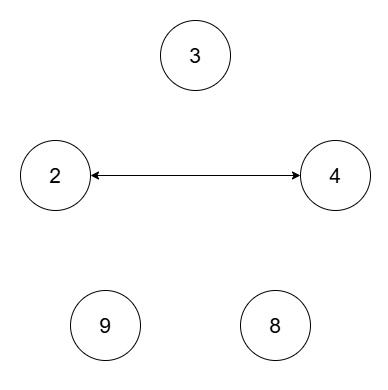LeetCode in Kotlin
3378. Count Connected Components in LCM Graph
Hard
You are given an array of integers nums of size n and a positive integer threshold.
There is a graph consisting of n nodes with the ith node having a value of nums[i]. Two nodes i and j in the graph are connected via an undirected edge if lcm(nums[i], nums[j]) <= threshold.
Return the number of connected components in this graph.
A connected component is a subgraph of a graph in which there exists a path between any two vertices, and no vertex of the subgraph shares an edge with a vertex outside of the subgraph.
The term lcm(a, b) denotes the least common multiple of a and b.
Example 1:
Input: nums = [2,4,8,3,9], threshold = 5
Output: 4
Explanation:

The four connected components are (2, 4), (3), (8), (9).
Example 2:
Input: nums = [2,4,8,3,9,12], threshold = 10
Output: 2
Explanation:

The two connected components are (2, 3, 4, 8, 9), and (12).
Constraints:
1 <= nums.length <= 1051 <= nums[i] <= 109- All elements of
numsare unique. 1 <= threshold <= 2 * 105
Solution
class Solution {
private class UnionFind(n: Int) {
var parent = IntArray(n) { it }
var rank = IntArray(n)
var totalComponents = n
fun find(u: Int): Int {
if (parent[u] == u) {
return u
}
parent[u] = find(parent[u])
return parent[u]
}
fun union(u: Int, v: Int) {
val parentU = find(u)
val parentV = find(v)
if (parentU != parentV) {
totalComponents--
when {
rank[parentU] == rank[parentV] -> {
parent[parentV] = parentU
rank[parentU]++
}
rank[parentU] > rank[parentV] -> parent[parentV] = parentU
else -> parent[parentU] = parentV
}
}
}
}
fun countComponents(nums: IntArray, threshold: Int): Int {
val goodNums = nums.filter { it <= threshold }
val totalNums = nums.size
if (goodNums.isEmpty()) {
return totalNums
}
val uf = UnionFind(goodNums.size)
val presentElements = IntArray(threshold + 1) { -1 }
goodNums.forEachIndexed { index, num ->
presentElements[num] = index
}
for (d in goodNums) {
for (i in d..threshold step d) {
if (presentElements[i] == -1) {
presentElements[i] = presentElements[d]
} else if (presentElements[i] != presentElements[d]) {
uf.union(presentElements[i], presentElements[d])
}
}
}
return uf.totalComponents + totalNums - goodNums.size
}
}

